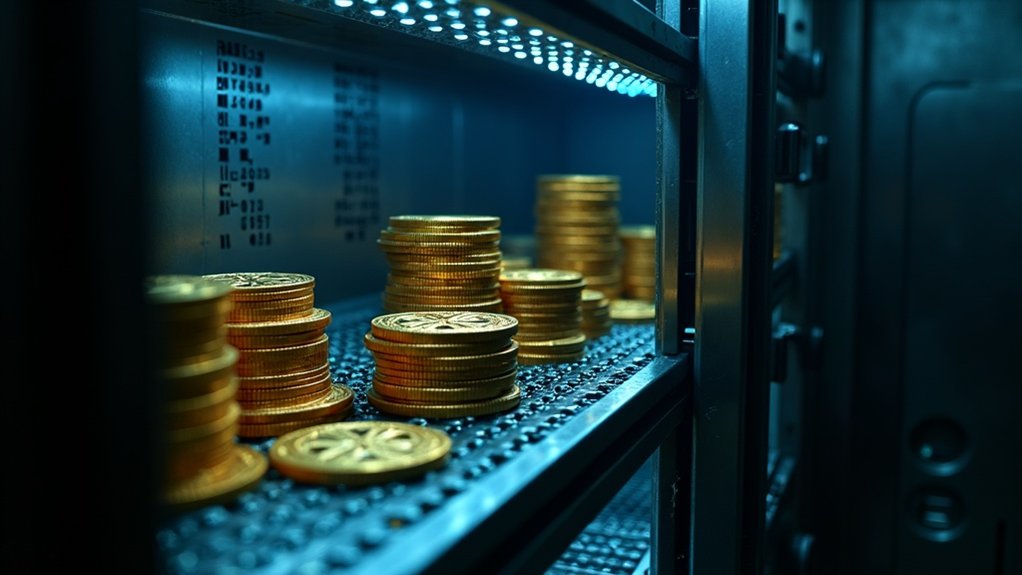The enigmatic Satoshi Nakamoto reigns supreme in Bitcoin wealth. Bitcoin’s creator possesses approximately 1.1 million BTC, mined when the cryptocurrency was practically worthless. That’s over $60 billion sitting untouched. Exchanges like Binance and corporations such as MicroStrategy follow, with the latter holding around 600,000 Bitcoin. Even governments have skin in the game, with the US owning 207,189 BTC. The rabbit hole of crypto wealth goes much deeper than most realize.
Where exactly does all that Bitcoin go? The digital gold rush has created some seriously heavy virtual wallets. Let’s cut through the mystery.
At the top sits the shadowy figure who started it all. Satoshi Nakamoto, whoever they really are, holds a whopping 1.1 million Bitcoin. That’s a fortune just sitting there, untouched for years. The coins were mined when Bitcoin was practically worthless. Funny how being first sometimes pays off big time.
The mysterious Satoshi sits on a dormant digital fortune worth billions, a silent testament to the power of being crypto’s creator.
Despite this massive stash, Nakamoto has zero special powers over the network. That’s crypto for you.
Cryptocurrency exchanges collectively hold the largest Bitcoin wallets. Binance and Robinhood top this list, managing enormous pools of other people’s money. These aren’t really single-owner wallets though—they’re more like digital vaults holding assets for thousands of traders. The total crypto market now approaches $4 trillion in value.
Recently, these reserves have been shrinking as more investors pull their coins off exchanges. Trust issues, maybe?
In the corporate world, Strategy (MicroStrategy) dominates with approximately 600,000 Bitcoin. That’s commitment! Tesla follows far behind with over 11,000 BTC, while Block Inc. holds more than 8,000. The Winklevoss twins have also secured their place among top holders with their impressive 70,000 BTC portfolio.
Block.one quietly sits on about 164,000 Bitcoin. These companies bet big on digital currency despite the volatility. Bold move.
Governments aren’t sitting this one out either. The United States government holds around 207,189 Bitcoin, mostly from busting criminals. Other countries have smaller stashes, but they’re not exactly broadcasting their crypto holdings on Twitter.
Meanwhile, Bitcoin ETFs and funds have accumulated roughly 1,250,000 BTC, about 5.9% of the total supply. BlackRock’s iShares Bitcoin Trust leads this pack with approximately 530,831 BTC, followed by Grayscale Bitcoin Trust with 199,586 BTC. The market is also seeing significant involvement from ETFs and Exchanges that represent over 1.6 million entities in the crypto ecosystem.
Frequently Asked Questions
How Does Bitcoin Mining Affect the Environment?
Bitcoin mining devours electricity—91 TWh annually, like a medium-sized country.
Mostly powered by fossil fuels, it spews 30-60 megatons of CO2 yearly. Not great.
Mining operations need massive infrastructure, guzzling water and land resources. E-waste from discarded hardware? Another problem.
Some miners are switching to renewables, using excess energy from oil wells or hydro.
But let’s be real—Bitcoin’s environmental footprint remains massive, straining local power grids and sometimes disrupting ecosystems.
Can Governments Confiscate Bitcoin Holdings?
Yes, governments can and do confiscate Bitcoin. Despite crypto’s “freedom from authority” image, the reality’s quite different.
When authorities have legal grounds—criminal activity, tax evasion, fraud—they’ll seize those digital assets. How? Through court orders, exchange cooperation, and good old-fashioned detective work.
But there’s a catch. Self-custody with private keys creates significant barriers. No keys, no Bitcoin.
That’s why some holders use cold storage and encryption to protect their stash from prying government hands.
What Happens to Bitcoin if the Internet Fails Globally?
Bitcoin effectively freezes if the internet fails globally. The network can’t process new transactions or confirm pending ones.
Your balance sits untouched on local copies of the blockchain—technically yours but unusable. No double-spending risks exist since nothing moves.
After internet restoration, nodes resynchronize. Some alternatives exist: mesh networks, Blockstream satellites, and Lightning Network channels might enable limited functionality.
But realistically? The system halts. Bitcoin becomes temporarily paralyzed. Simple as that.
How Will Bitcoin’s Limited Supply Affect Its Future Value?
Bitcoin’s limited supply of 21 million coins will likely drive its value higher over time.
Simple economics: limited supply meets growing demand equals price increase.
After each halving event, history shows significant price jumps.
Institutional investors are piling in, further squeezing available coins.
Network effects amplify this scarcity value.
Not guaranteed, though. Markets are weird.
Regulatory changes, technological disruptions, or mass psychology shifts could derail the whole equation.
But that cap? It matters.
Are Bitcoin Transactions Truly Anonymous?
Bitcoin transactions aren’t truly anonymous. They’re pseudonymous. Big difference.
Every transaction sits on a public blockchain for anyone to see. Forever.
Sure, wallet addresses don’t have names attached, but forensic techniques can connect those dots. Law enforcement has tracked down criminals through Bitcoin trails.
Exchange KYC requirements blow any anonymity claims right out of the water.
Want privacy? Bitcoin isn’t your best bet.
The ledger never forgets. Never.









